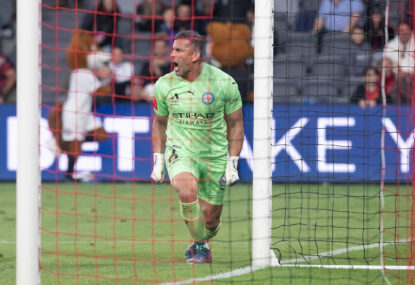Did it cross the line? Or didn’t it cross the line? Or was it on the line? It’s a conversation that has taken place at water coolers and pubs since the 1966 World Cup Final, disputing controversial decisions of sporting games all over the world.
It is perhaps the best thing about sport, the post-match discussion that arises out of a battle between two sides and their supporters, vying for success.
Having said this, all supporters’ want is a fair game decided by fair decisions.
Goal-line technology has been a contentious issue for years around the football world.
While most of the sporting world has evolved and embraced technology for the marvel it is, the football world has lagged behind the likes of AFL, NFL, rugby league and union in regards to the use of technology.
For what is the most popular sport in the world, the governing body FIFA (International Federation of Association Football) trails well behind the pack in terms of progress.
In this lagging process, World Cup matches, FA Cup semi finals and league games all over the world have been unfairly influenced and ultimately decided by human errors.
Errors on the biggest stages carry serious ramifications for all involved – players, managers and even the officials themselves.
Despite this, FIFA president Sepp Blatter has on numerous occasions dismissed the use of goal-line technology.
He wishes to keep the game traditional and technology free, stating that it would remove the human element from the game.
“Fans love to debate any given incident in a game. It is part of the human nature of our sport,” he famously argued.
However, at what cost is he going to allow this ‘human element’ to continue?
One has to wonder if Blatter slept well the night Frank Lampard was denied an equalising goal in a World Cup, knowing that it would spark mass debate all over the world.
All this for the sake of football’s precious ‘human element’ remaining in tact.
Lampard’s non-goal was a low point for the tournament and a crucial turning point of the game.
Denied what would have been an equalising goal, England crashed out of the tournament in a 4-1 defeat at the hands of Germany.
In light of the decision, Blatter was left with little choice but to finally re-open the debate.
It is pathetic that this deliberation will cost clubs and nations their dream of claiming prodigious titles.
Had these not been high-profile incidents, it is doubtful that any action would have been taken.
FIFA’s delayed and reactive trait has cost other teams dearly since and will only claim more victims the longer nothing is officially implemented.
Blatter has rejected systems because they only provide “95% accuracy”.
While it is a valid reason, most sports have implemented limited technology in order to give officials some assistance. It’s time FIFA did the same.
Replays would have clearly assisted with Lampard’s ‘goal’, where the ball was shown to be well over the line using a basic television replay.
Lampard is not alone in his support for the implementation. In a recent poll of 48 Europa League captains conducted by FIFPro (International Federation of Professional Footballers), only five of them voted against the introduction of goal-line technology.
Blatter’s desire to keep the game traditional and technology free are simply compromising the quality of his product, tainting it with injustices and controversies easily avoided.
There have been arguments that while this may bring correct decisions and peace of mind, stagnating or stalling play to examine decisions would ruin the spectacle that is football.
However, to compromise the integrity of football by overlooking a potential goal for the sake of the spectacle is a petty and shallow argument.
While it must remain entertaining, the correct and deserved result is of the utmost importance.
If we must protect the flow of the game, the review can be delayed until the ball is ‘dead’ (out of play).
This already occurs as officials delay bookings and fouls to allow a passage of play to flow.
Among the numerous delays that already occur within a game, one more to ensure a right decision should not deter the powers from introducing the system into the sport permanently.
In light of recent errors, FIFA again, in their reactive fashion have finally conceded and are trialling the Hawk-eye system in England’s friendly against Norway at Wembley Stadium.
However, this trial will not be available to officials, as results of the test will be discussed at a meeting on 2 July, when goal-line technology’s fate will be decided.
Better late than never, I suppose.
At the end of the day, football is a game based on scoring goals to win.
The spectacle, the drama and the excitement that comes from the human element may incite conversation at the water coolers and pubs all over the world, but the end result should not be compromised to the sake of it.
FIFA’s motto is “For the Game. For the World.”
It’s time FIFA lived up to their motto and helped answer the most important question in football – was it a goal?




































































































